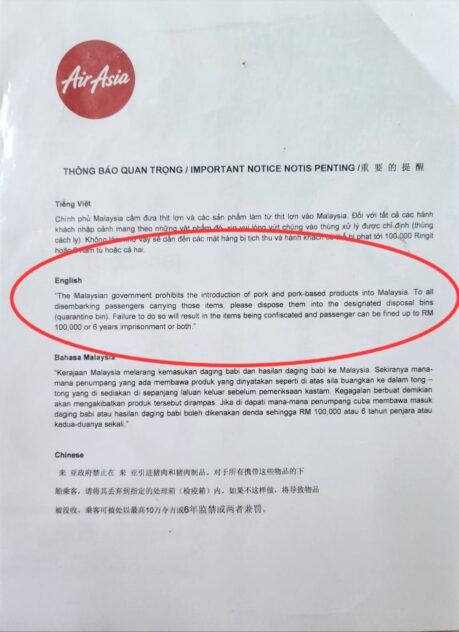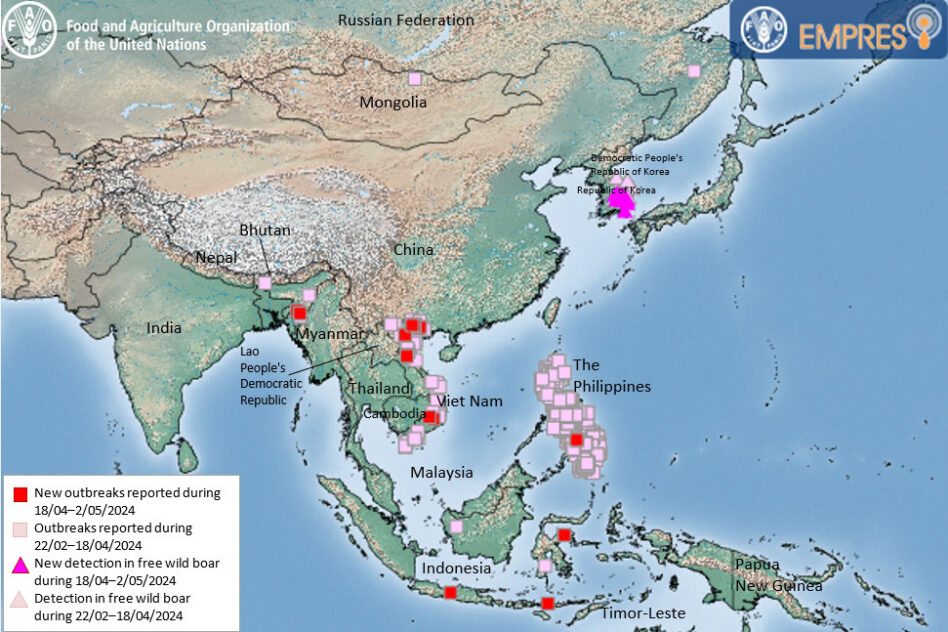BRINGING back juicy pork bacon from Down Under – or even sausages from Hong Kong – remains prohibited following implementation of what seemed to be a “temporary blanket ban” on the import of pork and pork products which dates back to the pre-COVID-19 days following the African Swine Fever (ASF) disease outbreak.
Many air travellers may not realise that the above ruling is being enforced until an AirAsia “Important Notice” in in four languages – English, Bahasa Malaysia, Chinese and Vietnamese – is being widely circulated on several WhatsApp group (the document has been certified as genuine by the budget carrier’s corporate communications unit).
“This is a government order through the Department of Veterinary Services and Customs,” an AirAsia spokesman told FocusM. “Warning and reminders have been put up at all airports in the country.”

Additionally, the online version on support.airasia.com which was updated on Oct 23 last year read:
Due to the recent outbreak of ASF, the Malaysian government has imposed a temporary ban on the admission of pork and pork products into Malaysia.
If you are flying into Malaysia from China, Macau, Hong Kong or Vietnam and carrying such items, please ensure you dispose them in the designated quarantine bins upon disembarking. Failure to do so may result in items being confiscated and a fine up to RM100,000 or six years imprisonment.
Interestingly, the AirAsia’s corporate communications spokesman further referred FocusM to a Bernama report dated Jan 28, 2019 quoting the then deputy minister of agriculture and agro-based industry Sim Tze Tzin as saying that temporary ban was implemented from Sept 7, 2018 after the ASF was detected in China a month earlier.
Sim added that the said ban includes pork and pork products carried as hand luggage by passengers travelling through sea and air routes so as to prevent the disease from entering Malaysia.
Back then, 10 countries were reported to be suffering from the ASF disease. They were China, Mongolia, Belgium, Hungary, Latvia Moldova, Poland, Romania, Ukraine and Chad in Africa.
However, a check by FocusM on the African swine fever (ASF) situation update in Asia & Pacific by the United Nations’ (UN) Food and Agriculture Organization (FAO) shows that ASF outbreak was still being detected in Malaysia as recent as July 2023.
“The first ASF outbreaks were confirmed in February 2021 in Sabah State on Borneo and on the Malay Peninsula in December 2021,” reported the FAO.
“ASF was detected in the Perak State in wild boars in July 2023 followed by ASF outbreaks in pig farms in Perak and Kedah states in late October (last year).”

As comparison, Malaysia is not alone in such predicament as FAO also noted that its more advanced southern neighbour, Singapore, confirmed its first cases of ASF in February 2023 in wild boar carcasses found in forested areas and nature parks.
“In April 2023, ASF was detected at a slaughterhouse in carcasses of live pigs imported from Bulan Island, Indonesia,” added FAO.
Meanwhile, a frequent flyer who is caught unaware with the ban wondered why domestic airlines, namely AirAsia and Malaysia Airlines ‘downplayed’ the existence of such an “important” ruling.
“Firstly, the AirAsia notification assumes a blanket ban when it is unclear if only tainted products from certain countries are prohibited but rather it gives the impression that Malaysia is banning pork-based products because it is an Islamic country,” he told FocusM.
“AirAsia should do more to explain that the ban is only temporary to curb the ASF from spreading into Malaysia for the wrong assumption linking the move to the government’s halal policy has somehow tarnished the country’s image.” – May 13, 2024









